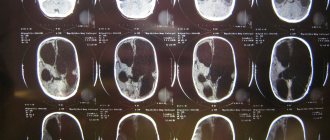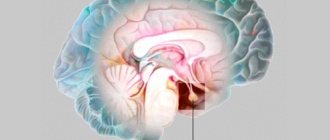Home / Important to know / Kingdom of Morpheus
Back
Published: 08/01/2020
0
344
Some people are interested in the question of why they have nightmares after binge drinking, because it would seem that alcoholic drinks contribute to the rapid onset of sleep. Doctors note that alcohol can lead to the formation of a large number of diseases. Indicators of observations and studies indicate that binge drinking leads to sleep disorders and the body does not fully rest. Long-term consumption of alcohol-containing drinks can lead to the development of insomnia, at a minimum.
- 1 The effect of alcoholic drinks on sleep
- 2 Causes of nightmares after drinking alcohol
- 3 Psychological Factors of Hangover Nightmares
- 4 Control methods
- 5 Help from a narcologist
Screams in his sleep when drunk
A specialist’s answer to a question from a visitor to the
IrMed website September 19, 2013, 22:47
Hello. Why does a person scream in his sleep when he falls asleep while drunk? This happens every time! He just screams in a voice that is not his own, as if he is being cut alive. A sober person sleeps peacefully. What does this come from? Maybe there is an explanation for this?
Dear readers, you can read more about the effect of alcohol on sleep in the article on the effect of alcohol on sleep.
Stanislav Radchenko October 2, 2013, 22:50
During intoxication, as with other types of anesthesia, inhibition of different parts of the cortex occurs unevenly. Therefore, for example, during nightmares in a state of intoxication, speech zones can be temporarily disinhibited, and the dream, with appropriate plot content, will be accompanied by screams and exclamations.
Igor March 14, 2014, 00:19
How can you stop screaming in your sleep when you're drunk? It’s clear that it’s better not to drink, but what if it works out? Is there some kind of medicine or something else?
Stanislav Radchenko March 24, 2014, 16:03
Igor, regarding this problem, it is difficult for me to imagine any other means of influencing the patient other than mechanical ones. For example, the endotracheal tube does not allow the tongue and pharynx to move sufficiently.
Bersex 9 July 2020, 22:53
My grandfather, when he is drunk, screams, howls, rolls on the floor and kicks his legs, makes strange drawn-out sounds with his lips, similar to sounds from one back place familiar to us all, he also stands in his sleep and mutters something, when you wake him up, he says nothing remembers. Is this some kind of psychological illness or what?
Berserk July 29, 2020, 02:36
My father never screamed while in an alcoholic state. Only after the war in Chechnya did he start screaming and falling out of bed; perhaps a person screams because of some kind of psychological trauma.
Vasya 8 August 2020, 13:49
I sleep peacefully when I’m sober, I even see dreams, but when I’m drunk I’m screaming like crazy in my sleep, people tell me this when I was a child, I got up a couple of times in my sleep and walked around, this is what my father told me! It is clear that one of the reasons is drunkenness, but are there other reasons? Maybe it's time for me to go to the mental hospital?
Maria November 15, 2020, 1:35 pm
Why is it that when my father comes home drunk he starts clicking and smacking his lips, it irritates me, maybe it’s some kind of injury in the head or something. Can you tell me?
Stanislav Radchenko December 2, 2020, 15:20
Maria, facial exercise stimulates the brain more than other movements. This is a way to stay active while intoxicated.
Styopa 13 November 2020, 17:35
My husband screams drunk in his sleep and sees witches and fights with someone, I’m very scared
Leave a message
All comments containing obscene language are mercilessly deleted. you can in a special section of the site: it does not read comments on articles.
Your email (not for publication)
Send me comments on this article By clicking the Send button, you agree to the site's Personal Data Processing Policy.
This site was made by experts: toxicologists, narcologists, hepatologists. Strictly scientific. Tested experimentally.
Think you know how to drink? Take the test, check yourself! 242,957 people completed the survey, but only 2% answered all questions correctly. What grade will you get?
How to stop screaming?
To get rid of nighttime screams, you can contact a specialist who will prescribe appropriate treatment.
You can also follow preventive measures, as well as some ways to normalize rest at night, on your own.
If you contact a specialist, you will most likely be prescribed complex treatment :
- taking vitamin supplements that improve the functioning of the central nervous system;
- taking sedatives and sedatives to improve sleep quality;
- prescription of physiotherapeutic procedures.
Remember that only a doctor can prescribe active medications.
Alternative medicine involves the use of herbal remedies with a mild calming effect:
- 1 tbsp. pour a spoonful of hawthorn, valerian and peppermint into 0.5 liters of boiling water and leave for 20 minutes. After this, strain the infusion and take 250 ml before and after waking up.
- A teaspoon of honey dissolved in a glass of water or milk will help normalize sleep You should drink it immediately before you go to bed.
People prone to allergic reactions should use alternative medicine treatment methods with extreme caution.
The following methods will also help:
- Take warm, relaxing evening baths . You can supplement the baths with aromatic substances with a mild odor - for example, lavender.
- Give up bad habits - smoking, drinking alcohol or reduce them to a minimum. Nicotine and alcohol negatively affect the quality of a person's sleep.
- Set yourself a strict daily routine - and schedule it hourly.
Be sure to take into account that work time alternates with rest - in order to avoid overloading the body.
Review your diet - perhaps your diet is not balanced enough. This is why doctors prescribe vitamin complexes for this disorder - since there may be a lack of vitamins in the body.
You can also listen to quiet, calm music while lying or sitting in a chair. Try to distract yourself from your problems at this time and focus on your own peace and relaxation.
Sleep is an important component of proper rest . A sleeping person regains not only his physical strength - first of all, normal sleep is important for the proper functioning of the nervous system.
Screaming during a night's rest can signal a malfunction of the central nervous system, therefore, if this disorder is constantly recurring, it is advisable to find out its cause and begin to eliminate it.
Why does a person scream and talk in his sleep:
source
My boyfriend screams in his sleep at night.
Hello. My boyfriend and I have been dating for almost 4 years (he is now 19 years old), we are very close, we know everything about each other and do not hide anything. About two years ago he screamed in my sleep for the first time in front of me. At that moment I was terribly scared and did not sleep all night, and in the morning I tried to talk to him, but he convinced me that everything was normal, that this had happened before, that everyone was already used to it and that he did not have nightmares.
Posted by: Christina
There is such a thing as dream-speaking. Scientifically speaking, it is somniloquy. I'm guessing this is it. Doctors believe that there is a hereditary predisposition to it. Those. Simply put, it is often inherited. From parents, grandparents, by genes. People who suffer from sleep-speaking mutter in their sleep, periodically pronounce some words loudly and even scream, this is how they shout. Night conversations and mutterings last about 30 seconds, on average. This happens at the change of sleep phases. A person does not sleep in deep sleep all the time; the REM sleep phase is replaced by the slow sleep phase. And then slow-wave sleep smoothly turns into superficial sleep, rich in dreams. So, in people prone to sleep-talking, at some point the motor centers of the cerebral cortex are excited when the phases of sleep change. This is their predisposition.
I can’t say exactly how, but the phenomenon is associated with sleepwalking. It often manifests itself in people who are prone to sleepwalking and have relatives who have experienced sleepwalking.
This phenomenon often manifests itself in childhood, more actively than in adults. Therefore, the most comprehensive information can probably be provided by the parents of a young man. But for some, it persists even into adulthood. It is activated at times of stress, increased emotional stress, especially if a person holds back emotions, but they do not disappear anywhere. Nervous tension during the daytime, fatigue from study or work, lack of sleep, and improper daily routine are very influential. And in a dream, a person sees a dream, most likely it reflects his fears, and begins to talk. But when he wakes up, most often he does not remember what he screamed in his sleep and cannot remember the dreams themselves.
Now, if you are concerned about the health of your young man, you can discuss this topic with him. Remember what happened 2 years ago, maybe there was some kind of strong stress, psychological trauma. How this manifested itself in his childhood. If something bothers him greatly, there are unresolved problems that he “pushes” away from himself, does not want to think about them, cannot make a decision, is afraid of something, this could be all the consequence. Those. problems must be resolved internal (psychological) and external, reduce the level of anxiety and anxiety and reduce the load on the nervous system. Lack of sleep has a significant impact. Frequent overwork. Those. It is important to regulate your daily routine. Alcoholic drinks, coffee at night are harmful, watching scary movies, active exercise in the evening. And of course, all sorts of conflicts with other people can have a significant impact. It is worth thinking about resolving unnecessary conflict situations, if any.
The effect of alcoholic drinks on sleep
There is a popular belief that alcohol has a hypnotic effect, but this is an unconfirmed theory. Drinking alcoholic beverages every day and in quantities over 50 grams. leads to alcoholism and also negatively affects sleep. This is explained by the fact that drinking has a negative effect on dream cycles.
- prevents you from falling asleep quickly;
- leads to the fact that sleep is characterized by short duration and superficial dreams;
- makes rest intermittent;
- leads to nightmares and difficult dreams.
Thus, alcohol, especially drunk in the evening, leads to a person having difficulty sleeping and the body cannot fully recover. Constant lack of sleep creates a disturbance in night rest and leads to the development of diseases such as apnea, insomnia, sleepwalking, etc.
Why does a person scream at night in his sleep and what to do?
Good day, dear readers. In this article we will consider a situation when a person screams at night without waking up from sleep. You will find out what reasons may precede this. Find out how to help in such a situation, what to do to get rid of it if this problem has affected you personally. Let's talk about actions that will help minimize the risk of night screaming.
Possible reasons
If you are familiar with the phrase “I scream at night in my sleep,” you were probably interested in what could precede such a phenomenon, what exactly contributed to your screaming at night. If we consider such manifestations in adults, the following factors may be to blame:
- nightmare;
- abrupt awakening, which led to fright;
- the result of prolonged stress - when a person is in constant stress or worries for a long time;
- taking certain medications can also affect the appearance of such a phenomenon as screaming in the middle of the night;
- bad habits can also negatively affect night's sleep;
- the consequence of a disrupted daily routine;
- long-term use of sedative medications or their abrupt withdrawal;
- the presence of conditions unsuitable for the sleeper, for example, high humidity or too high room temperature;
- the result of high body temperature is screaming during fever;
- manifestation of a neurological disorder;
- presence of mental illness.
Separately, it is worth considering two points that are often displayed in adults.
- Scream only in the presence of other people. There are cases when a person, being in the same room or bed with a certain person, begins to scream in his sleep. This phenomenon is explained by the fact that a certain person provokes an attack of night screaming. The person does not feel safe next to him, perhaps experiencing a threat, accompanied by anxiety and irritation. At the same time, in the daytime he doesn’t even know about it. His subconscious signals in a similar non-standard way.
- The result of alcohol abuse. Often a cry in the middle of the night is heard from a person who has taken alcohol the day before. The fact is that drinking alcohol while intoxicated is considered to be similar to anesthesia. In some parts of the cerebral cortex, inhibition occurs, resulting in a night cry.
If we consider the situation in children, the following points may occur:
- the smallest screaming through their sleep may indicate a desire to refresh themselves;
- may be a consequence of daytime impressions, which manifest themselves in a similar way in a child’s fragile nervous system;
- the consequence of watching cartoons or films before bed, which had a disturbing effect on an impressionable child.
Characteristic manifestations
When we talk about screaming in a dream, we can consider certain situations.
- The man speaks in a raised voice. At the same time, it seems that he is turning to someone or calling for help. Those who are nearby at this moment may get the impression that the person has awakened.
- Loud utterances can be clear or incoherent depending on the stage of sleep.
- The person screams, cries or waves his arms. This behavior is especially noted in the case of a nightmare or under the influence of alcohol or drugs.
- The sleeping person gets out of bed and begins to scream or ask questions. Symptoms similar to sleepwalking
Despite the fact that in most cases, night screaming is not a threat to human health or his life, there are still certain situations when this phenomenon gives cause for concern:
- daily nightmares that persist for a long time;
- the appearance of sleepwalking;
- the onset of teeth grinding;
- suffocation in sleep;
- temperature rise above 38 degrees;
- the appearance of trembling attacks during periods of calm.
It is important to understand that such manifestations may indicate serious abnormalities in the body, the presence of pathological processes. Initially, you can seek help from a neurologist; if necessary, this specialist will redirect you to a psychologist, psychotherapist or somnologist.
Methods of counteraction
- If you understand that you need to take a sedative, then it is better to seek help from a specialist who can choose a safe remedy that does not have a negative effect on the body. Your doctor may prescribe tincture of valerian or motherwort as a sedative.
- The doctor may also prescribe nootropics - drugs that improve the functioning of the brain and also have a positive effect on normalizing sleep.
- Physiotherapy may be prescribed along with drug therapy. Among which are noted: mud treatment, electrophoresis, relaxation baths.
- The doctor may prescribe a multivitamin complex if he deems it necessary. He will also advise enriching your diet with foods containing magnesium, B vitamins, and tryptophan.
- When faced with screams at night, analyze whether you have a suitable pillow for sleeping. Perhaps it’s time to change it, buy a modern orthopedic option.
- Before going to bed, you can perform a certain ritual, namely: take a relaxing bath with the addition of herbal decoctions that have a calming effect.
- Before going to bed, do not watch scary films that excite your nervous system. Especially if you are overly impressionable and have repeatedly noticed the connection between these phenomena. Do not sit in front of a monitor screen for a long time.
- If you are visited by disturbing thoughts, you cannot relax, you feel excessive tension, then it is recommended to turn to Eastern practices, do yoga or meditation. You can also visit a psychologist or psychotherapist, who in their sessions will help you cope with the problem that has arisen and teach you how to relax.
Precautionary measures
- Try to go to bed at the same time every day. It is advisable to do this no later than 23:00. It is recommended to sleep at least seven, and preferably eight hours.
- Try not to watch movies, sit in front of the computer, or study new information before going to bed.
- It is recommended to take walks in the fresh air in the evening.
- Take care to give up bad habits. Remember that nicotine, alcohol and drugs have a negative effect on the body, including a person’s sleep.
- It is worth taking care to create comfortable conditions for a night's rest. It is necessary that the room has an optimal temperature (from 18 to 22 degrees) and humidity (50 - 60%).
- It is important not to overeat before going to bed. It is recommended that the last meal be at least three hours before the night's rest.
Now you know why a person can scream in his sleep. As you can see, there may be several reasons influencing the occurrence of such a phenomenon. Therefore, it is extremely important to understand what exactly in your case causes night screaming. Remember that you should not self-medicate, for example, start taking medications prescribed for a relative to normalize sleep. You may have a completely different case, and with such an attraction you will only harm yourself.
Folk remedies
Among folk remedies, the most popular are the following:
- Valerian. An infusion can be made from its root (two tablespoons per liter of water), which should be taken twice a day.
- Honey diluted in warm water will perfectly soothe you at night.
- Relaxing bath with a decoction of chamomile, linden, string, and lavender essential oil.
- A calming effect can be achieved by placing a bag of dried chamomile, lemon balm, lavender, and linden flowers next to the pillow.
It is important to remember that most sleep problems are related to the tension that a person accumulates at night. You need to get rid of it, stick to a daily routine and lead a healthy lifestyle. Then the body will be able to fully rest at night and function fruitfully during the day.
Night screams during sleep in adults: causes and solution to the problem
Talking in your sleep is considered parasomnia. In medicine, the phenomenon is called somniloquy. The problem most often affects children who have not reached puberty. Experts attribute the failure to the development of the nervous system and a weakened psyche. With age, the condition should normalize on its own. If an adult screams in his sleep, the reasons may be more serious. Psychologists' advice, folk remedies and medications are used as treatment. The doctor is obliged to draw up a course of therapy, focusing on the diagnostic results.
Night screams during sleep in adults
Sleep-speaking (somniloquy) is a common and harmless parasomnia. A person talks in his sleep or even shouts certain phrases loudly, but in the morning he does not remember anything. The attack lasts about half a minute with a high probability of recurrence.
The problem affects approximately 6% of the world's population. The majority of patients are not older than 16 years. The risk group includes people who abuse bad habits, do not maintain sleep hygiene, or have a hereditary predisposition.
The severity of the failure depends on the causative factor. Children scream because of nightmares, and mutter incoherent sounds when faced with a large volume of incoming information. In adulthood, emotional shock comes to the fore. The situation is aggravated by taking medications, alcohol and constant stress.
Characteristic manifestations of the phenomenon
Somniloquy is usually divided into 2 types. The first type is characterized by the pronunciation of clear phrases during the rapid stage of sleep, and the second type is characterized by incoherent sounds during the slow stage. Sleep talking rarely mirrors dreams and occurs to varying degrees. Relatives of the patient can promptly find out about the presence of parasomnia by the following signs:
- The sleeping person turns to someone or begins to call for help, which creates the appearance of awakening.
- Words are spoken in a whisper or in a loud voice. Speech is clear or unintelligible depending on the stage of sleep.
- A person begins to scream, wake up in the middle of the night, cry and wave his arms if he has a terrible dream. The situation is aggravated under the influence of drugs, drugs or alcohol.
- The sleeper, without waking up, is able to get out of bed, scream or ask something from relatives. Characteristic manifestations of somnambulism.
The problem is rarely identified on its own, since in the morning the patient does not remember anything. They learn about this type of disorder from people sleeping next to them, who are forced to constantly hear screams, unintelligible sounds and conversations at night.
Finding the reason
Experts in the field of neuropathology and psychiatry believe that screams during sleep occur against the background of excessive stimulation of the nervous system. Perhaps the patient often drinks coffee before bed or watches horror movies in the evenings. In second place are the consequences of the accumulation of negative emotions due to regular exposure to stressful situations. If you don’t learn to relax and throw out the negativity, psychosomatic problems will begin to develop over time. A general list of reasons why people scream in their sleep is given below:
- Nervous overexcitation. Frequent swearing, bad habits, fear of certain factors, disruption of daily biorhythms, watching horror films and taking tonics contribute to the development of parasomnia. Due to the combination of irritants, nightmares appear, interfering with sleep and provoking sleep talk and sudden awakenings.
- Fear under the influence of external factors. You can scream in fear in a dream due to noise, shaking and other sudden and loud actions.
- Taking medications. Disruptions in the sleep-wake rhythm develop under the influence of strong psychotropic drugs. Sleepy speech occurs when treatment is abruptly stopped or at the beginning of treatment.
- Mental disorders. Many variants of parasomnia are common in mentally ill people.
- Impact of alcohol. A drunk person tosses and turns and screams in his sleep due to disproportionate inhibition of parts of the brain. The glitch is especially pronounced when you have nightmares.
- Failure to meet healthy sleep criteria. Stuffiness, ambient noise, light in the eyes and other irritants reduce the quality of rest. Gradually, due to lack of sleep, various types of failures develop.
Reasons for concern
Screaming at night stops in children under 16 years of age. If the problem remains relevant or worsens, you will need the help of a neurologist. The specialist will check the child for neurological disorders. If there are no failures, the patient will be redirected to a somnologist and psychotherapist to draw up a picture of sleep and examine the psyche. In some cases, it is urgent to take action before the stated deadline. The following list of alarming symptoms will help you get your bearings in a timely manner:
- regular night awakenings due to nightmares;
- increased activity of sweat glands;
- development of enuresis or encopresis;
- manifestation of sleepwalking;
- detection of symptoms of shortness of breath;
- temperature rise above 38°;
- identifying cases of body shuddering during rest;
- manifestation of teeth grinding;
The voiced situations cannot be left to chance. Alarming symptoms may indicate the development of serious pathological processes. The patient needs to be urgently examined to draw up an optimal treatment regimen and prevent dangerous consequences.
Treatment Options
On their own, patients can try to eliminate exposure to external irritants and use available methods of calming the nervous system. This advice is relevant if there are no warning signs. In other cases, you will need the help of a doctor. The course of therapy may include the following treatment options:
- traditional methods;
- folk recipes;
- advice from psychologists.
The treatment regimen will have to be combined with sleep hygiene. Treatment is aimed at stopping the causative factor and eliminating discomfort.
Traditional medicine
Traditional methods are used if the malfunction is difficult to eliminate simply by following the rules of healthy sleep. A somnologist prepares a course of treatment based on the results of the examination. A treatment scheme with 3 integral elements is presented:
- taking vitamin complexes;
- undergoing physiotherapeutic procedures;
- the use of drugs to calm the nervous system.
Folk recipes
Traditional medicine rarely causes adverse reactions and can be easily prepared at home. It has a sedative effect thanks to lemon balm, valerian, hawthorn and other natural ingredients. The following methods are suitable for normalizing sleep:
- Herbal infusions with a sedative effect eliminate nervous excitement. The medicine is prepared from 1-2 tbsp. l. collection (hawthorn, valerian, peppermint), poured with 500 ml of boiling water. After 20 minutes of infusion, you should discard the raw materials and leave the liquid. Take ½ cup morning and evening.
- Inhaling relaxing aromas calms the nervous system. The patient needs to pour lavender, chamomile and lemon balm in equal parts into a cloth bag and place it under the pillow or next to the bed.
- Warm water with 1 tsp added. Honey perfectly relieves nervous tension. It is enough to drink 1 cup of sweet drink before bed.
- Evening foot baths allow you to relax and forget about your problems. The effect will be improved by adding essential oils, pine needles and chamomile to warm water.
Most methods are relevant for treating representatives of any age group.
Recommendations from a psychologist
Screams in a dream are regarded by experts as a manifestation of suppressed emotions. In real life, many people cannot fully express dissatisfaction, irritation, and resentment due to the disapproval of such demonstrations by society. Gradually, negativity accumulates, which leads to the development of parasomnia.
As a treatment, it is enough to understand the cause of the failure and “pour out” the emotions to a loved one
person or express your indignation in writing. You can repeat the procedure until complete recovery. If the recommendation does not help or the patient is not able to understand what exactly is “compressed inside”, you need to do the following exercise:
- find a comfortable body position;
- close eyes;
- make sure your breathing remains even;
- remember your happiest memory;
- think about the sensations you experience after waking up;
- Comparing emotions, draw a conclusion for yourself.
If you perform the exercise correctly, you will be able to discern the source of the problem. Further actions should be aimed at releasing suppressed emotions.
Help from a narcologist
If a person complains that he cannot sleep peacefully for several days due to nightmares or insomnia, only a qualified specialist can help him.
The narcologist will prescribe a drip that helps remove alcohol breakdown products and toxic substances from the body. After this, the patient feels a significant improvement, falls asleep with ease, nightmares disappear, and his mental state normalizes. The main thing is that there is a disappearance of the desire to get drunk.
It should be remembered that self-selected remedies do not always help with poor sleep after alcohol. In view of this, you need to consult a doctor.
Why does a person scream in his sleep and how to treat it
Many people suffer from regular lack of sleep, which has one very important reason - screaming in their sleep. How can this phenomenon be explained, and how does it affect our body? At the moment, official medicine cannot accurately answer the question of why a person screams in his sleep. However, there are a number of assumptions that connect such an anomaly with a physical and mental state. Let's find together the root cause of deteriorating sleep quality and regular screaming.
Possible reasons
Such an anomaly clearly indicates excessive excitation of the nervous system.
There may be several options in this case. It is quite possible that you drank a cup of coffee at night, watched a scary movie, or became too deeply immersed in your own everyday problems. However, most doctors tend to consider the negative emotions that we have encountered throughout the day as the main cause of screaming. According to psychologists and psychotherapists, it is extremely undesirable to lock such emotions inside yourself. This is fraught not only with problems with night sleep, but also with the appearance of severe psychosomatic disorders. Learn not to accumulate, but to let go of all negativity, give it a way out.
To improve your sleep and finally get rid of screaming at night, find the cause of the negative emotion. It is quite possible that this is a certain person. Talk to him and solve the problem.
In addition to negative feelings, the following situations may be the reason why a person screams at night:
- A scary or unpleasant dream is a common cause of screaming. At the same time, he will be accompanied by profuse sweating and rapid heartbeat. The person himself can both wake up and calm down directly in his sleep, without waking up at night.
- If you wake up a sleeping person abruptly (shake him by the shoulders or raise your voice), then most likely he will wake up screaming. Don’t forget, even a quiet sound can penetrate the consciousness of a sleeping person and trigger a defensive reaction in the form of an exclamation. As a rule, this happens when he is in deep sleep.
- You should also pay attention to medications. This is especially true for drugs that affect the nervous system. Among the side effects of some of them are the appearance of feelings of anxiety and restlessness, and disturbance of night sleep.
Treatment
People often ask what should I do if I scream in my sleep? Doctors advise to calm down and not panic. This phenomenon happens all the time. If you notice a deterioration in the quality of night sleep, first determine the cause and only then begin treatment. The following tips and tools will help you with this:
- Make an appointment with a specialist who will help you choose safe sedatives and hypnotics. Nootropic medications or racetams can help improve brain function and stop you from screaming at night. Do not self-medicate. The specific type of drug and the optimal dosage are determined only by the doctor. Otherwise, the clinical picture may worsen further.
- In combination with drug treatment, physiotherapeutic procedures in the form of mud treatment, relaxation baths, electrophoresis, and so on are often prescribed.
- Multivitamin complexes, as well as useful microelements, effectively combat dysfunction and unpleasant dreams. In this case, we recommend paying attention to foods high in tryptophan, vitamin B and magnesium.
- Another great remedy is a soft pillow for night sleep, filled with linden inflorescence, hops, chamomile, lavender, lemon balm and some other medicinal plants.
- Such a recipe would be useful. Take 200-250 g of clean water (about one glass) and dissolve 2 tablespoons of honey in it. Then you need to slightly heat the solution over low heat and add 150 g of finely chopped turnips. Continue cooking it for 30 minutes. The final stage of preparation is to remove the broth from the stove, cool and take 40 ml 4 times throughout the day (the last dose is immediately before bedtime).
- A warm foot bath will help you relax and prepare for bed. Before the procedure, add a decoction of linden flowers, chamomile, lemon, pine, and a few drops of eucalyptus or lavender essential oil to a container of water.
- An infusion based on valerian roots also has a beneficial effect on the nervous system. To prepare it, take a tablespoon of the crushed plant and pour 500 g of hot water (you need to leave for at least 20 minutes). Divide the broth into two equal parts. Drink one just before bed, the second immediately when you wake up.
- Dill seeds boiled in Cahors or any red wine are good for calming the nerves. For 500 g of wine we need about 50 g of seeds.
- Prepare an oil infusion of wormwood seeds - an excellent remedy for relieving tension. For one part of raw materials we need three parts of vegetable oil (you can use any). Before pouring oil into the seeds, grind them first. The solution must be infused for at least 10 days. After this, take it a couple of drops with a piece of refined sugar (you can increase the dose to 4 drops).
Screams in a dream, although they occur quite often, are not the norm for humans. This indicates that the psyche is overstrained or working to the limit.
If a person, in addition to screaming, actively sweats, walks in his sleep (sleepwalking) and regularly wakes up for no reason, be sure to make an appointment with a doctor. It is quite possible that such an anomaly is a consequence of one or another mental illness.
Follow these tips:
- do not accumulate negativity in yourself;
- give him a way out (let your surroundings not suffer);
- listen to pleasant music;
- lead an active lifestyle;
- take walks in the fresh air more often.
You can choose any of the above methods. Don't be afraid to experiment and try different options. The main thing is that the method you choose helps you quickly and safely get rid of night screaming.
Treatment Options
On their own, patients can try to eliminate exposure to external irritants and use available methods of calming the nervous system. This advice is relevant if there are no warning signs. In other cases, you will need the help of a doctor. The course of therapy may include the following treatment options:
- traditional methods;
- folk recipes;
- advice from psychologists.
The treatment regimen will have to be combined with sleep hygiene. Treatment is aimed at stopping the causative factor and eliminating discomfort.
Causes of nightmares after drinking alcohol
The results of the studies indicate that nightmares with one-time manifestations do not pose a threat to health. In a similar way, the human body develops resistance to stress, and the subconscious tries to solve the difficulties that arise in a person’s life. If nightmares are associated with drunkenness and bother you regularly, you need to reconsider your lifestyle and take measures to combat it.
Reasons for having nightmares after a hangover include:
- Impaired brain activity. The human brain does not stop functioning even during sleep. Drinking alcohol-containing drinks leads to pathological processes in the cortex. This is what explains the appearance of nightmares. Such conditions can also bother a person as a result of certain mental disorders. When these problems are combined, the formation of severe complications is observed.
- Disruption of the nervous system. Alcohol has a bad effect on the central nervous system, leading to decreased resistance to stress. Scary dreams also occur due to mental illnesses associated with alcohol addiction.
- State of apnea. Alcohol leads to partial or complete blocking of the respiratory centers and the supply of insufficient oxygen to the body. The body is in a stressful state, provoking the active production of adrenaline. The heartbeat will increase; it is at this moment that scary scenes associated with moments when a person is close to death may appear. This, in some cases, saves a person from death if there are severe diseases of the cardiovascular and respiratory systems.
- Mental problems. Binge drinking provokes the appearance of mental disorders and anxiety during sleep, provoked in the vast majority of cases by nightmares. Alcoholics who are in a state of delirium tremens can also have terrible dreams; they can manifest themselves in episodes of persecution and pursuit.
Having found out the cause of nightmares during a hangover, it will be easier to prescribe an adequate treatment regimen. However, the development of tactics for restoring the body is under the supervision of a group of doctors - a narcologist, a cardiologist and a psychotherapist.










